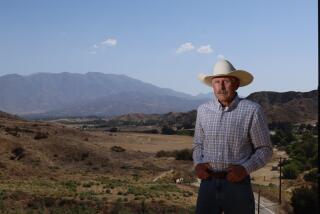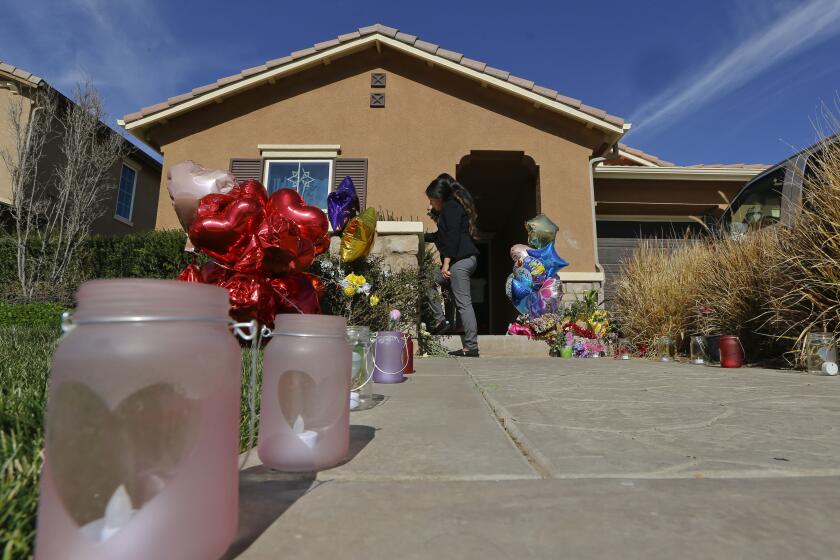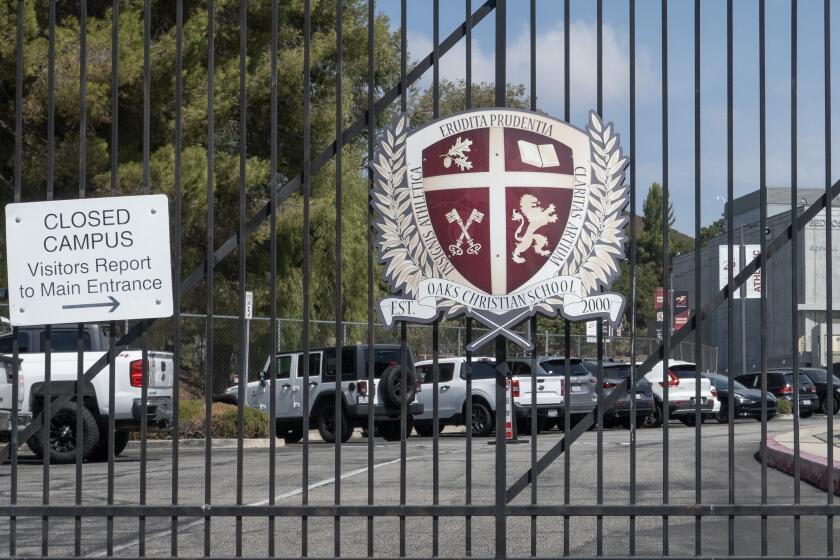Plan Would Assess Tax to Pay Off Developer : Newbury Park: Homeowners opposed to a shopping mall would generate $2 million to buy the property.
Newbury Park residents will get their first glimpse tonight of a proposal that would assess them $2 million in new taxes to pay a developer to abandon plans for a neighborhood shopping mall.
The rough outlines of the proposal calls for an estimated 1,500 to 3,000 homeowners to pay developer Albert Cohen to give up his dream of building a strip mall and supermarket on a corner of his property, located southwest of Kimber Drive and Reino Road.
By contributing up to $100 a year to a benefit assessment district, taxpayers living within three-quarters of a mile of the property could generate $2 million over several decades, said David Armanetti, the consultant who devised the proposal.
The city of Thousand Oaks would use that tax money to buy the 14 acres of wetlands and riparian habitat that Cohen had planned to turn into a mall. Left undeveloped, the land would provide the Flood Control District with much-needed flood protection because it forms a natural basin, Armanetti said.
“I don’t want to sound like Bill Clinton and talk about shared sacrifice and spreading the burden, but everyone has to give a little,” Armanetti said. “We think this is the only viable option that will satisfy residents, satisfy the city and still be satisfactory enough to the developer so he won’t sue.”
Wrangling over the Cohen property has dragged on for almost a dozen years, culminating in July when the City Council rejected the developer’s plan to build 170 houses and a 117,600-square-foot shopping center.
Cohen and his father, Nedjatollah Cohan, have filed a suit in Ventura County Superior Court asking a judge to overturn the council’s decision. The elder Cohan, whose son changed the spelling of his family name, collapsed in tears when the council turned down his project after a seven-hour hearing.
In an effort to avoid a court battle, consultants with Envicom Corp. of Agoura Hills volunteered to draft a fresh development plan. Their mission: balancing the developers’ need to protect a multimillion dollar investment and the neighbors’ concern about the noise, pollution and traffic a shopping mall would generate.
At tonight’s meeting, Armanetti will divulge more details of his plan and ask for citizen input on the proposed tax, which has to pass a public referendum and a City Council vote before it can be implemented.
The meeting begins at 7 p.m. at Sequoia Intermediate School in Newbury Park.
So far, the consultant has won provisional thumbs-up from city planners and the developers, who participated in negotiations during the past three months.
“People will have to put their money where their mouth is if they don’t want to see a large shopping mall,” Cohen said, describing himself as “cautiously optimistic” that the plan would work.
While emphasizing his willingness to compromise, Cohen said it would take more than $2 million to persuade him to abandon the shopping mall, which he had been counting on to bring in most of his revenue.
“The numbers that have been put on the table are extremely low,” he said.
To augment the proposed tax money, Envicom’s consultants have asked the City Council to give the developers 4.5 acres of city-owned land next to the disputed parcel.
The donated land could support about 100 townhouse units, while the original parcel--minus the 14-acre wetlands--could be built up with single-family houses, Armanetti suggested. He envisions 35 large lots around the property’s fringes and 110 mid-size units not visible from the street.
But while that model conforms to the wishes expressed by scores of residents during a rowdy town meeting in January, some Newbury Park activists remain dubious about the plan.
“My first reaction is, why should we pay the developers off?” Evelyn Cassaro said.
Community leader Diane Doria added: “The tax will be the telling point. I really don’t think the majority of people will go for it.”
The notion of taxing a small group of residents to protect an environmentally sensitive parcel also dismayed Councilwoman Elois Zeanah.
“I’m aghast,” Zeanah said. “I would have serious problems with asking residents to cough up $2 million in taxes to make a developer happy.”
Arguing that the City Council should simply rezone the property to allow only single-family houses, she called the plan “a developer-friendly proposal” that caved into Cohen’s demands.
The City Council has also reduced the maximum permissible density, but 25% of the land remains available for commercial construction.
Given the complexity of the case, Envicom’s proposal most likely represents a final attempt at compromise, the developer and city officials said. Cohen has vowed to press forward with his lawsuit unless he and the city reach agreement soon.
If the case goes to court, a judge would hand down an all-or-nothing decision on Cohen’s original development plan, complete with shopping mall and clusters of high-density townhouses.
“We’re presenting the residents with a choice: You make a small investment to get the project you want, or you go to court and take the risk of getting the project you hate,” Armanetti said.
Mayor Judy Lazar, who has tracked the project’s tortuous path through the Planning Commission and City Council, echoed the consultant’s words.
“Envicom has come up with some creative approaches, and now we’ll see what the residents--who have for years clamored for an alternative--have to say,” Lazar said. “Nothing in this life is free.”
More to Read
Sign up for Essential California
The most important California stories and recommendations in your inbox every morning.
You may occasionally receive promotional content from the Los Angeles Times.










